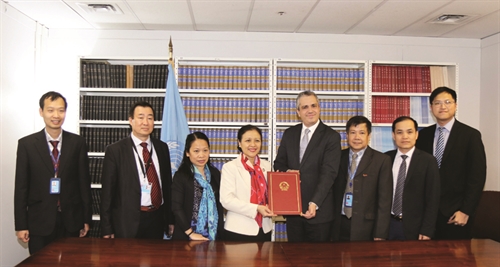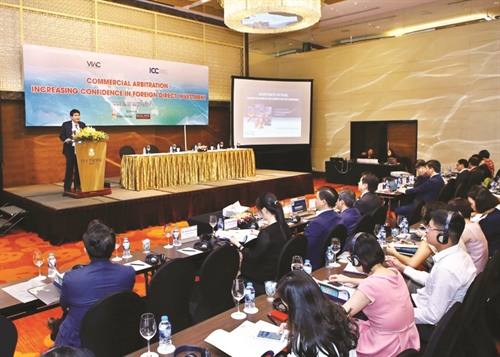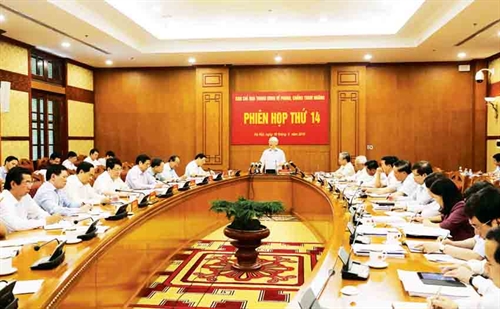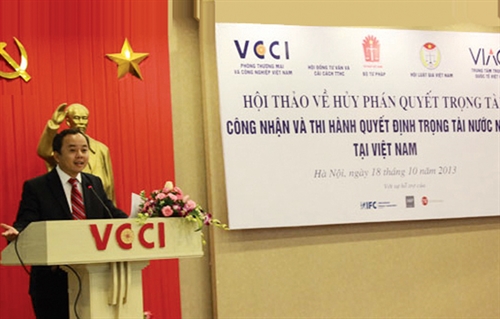Vo Thi Thanh Linh, LL.M
Law Faculty - Da Lat University
Online advertising has proven to be a trendy choice of businesses. Revenue of Vietnam’s online advertising market mounted to USD 76 million in 2017 and is forecast to increase by three folds in the next five years[1]. However, there remain several limitations in the law regulating Internet advertising such as regulations on protection of interests of online customers, foreign traders’ right to run online advertisements, advertising of some special goods, products and services, management of new types of advertising, and competence for state management for online advertising.
Protection of consumer rights
When buying goods and services online, one of consumer rights is to get access to complete, accurate and specific information. In a transaction, the right to access to information of one party corresponds to the obligation to provide information of the other party. This has been prescribed in several documents, including the 2005 Commercial Law[2], the 2006 Law on Information Technology[3], the 2010 Law on Protection of Consumer Rights[4], and the 2015 Civil Code[5]. According to Article 17.3 of Government Decree 99 of 2011 detailing and guiding the implementation of a number of articles of the Law on Protection of Consumer Rights, unless otherwise agreed by involved parties, when a trader fails to properly or fully provide the information as prescribed, a consumer may unilaterally terminate a contract within 10 days after entering into the contract. In this case, the consumer is not obliged to pay any costs related to the contract termination and will only pay for the goods or service he has used. This regulation gives consumers enormous power, allowing them to verify and assess information and proactively terminate contracts without having to bear any costs if detecting dishonesties of sellers.
However, reality shows that sellers often evade responsibility and refuse to settle customers’ return and refund requests for goods or services purchased online, even in case the goods or service quality does not match their advertisements. The reason behind the situation is the lack of specific regulations on sellers’ and online advertising agencies’ responsibility to settle consumers’ complaints in case of distance selling transactions. This is clearly one of the risks incurred when entering into distance contracts[6]. Customers usually live far from the places where sellers are based and seem unaware of where to seek legal assistance. Besides, joint liability between goods and service suppliers and online advertising agencies has not yet been identified and, as a result, they pass the buck to each other or delay the settlement of consumers’ complaints.
Foreign traders’ right to advertising
Under Government Decree 181 of 2013 detailing a number of articles of the 2012 Law on Advertising (Decree 181), websites of foreign organizations and individuals providing cross-border advertising services are defined as websites with overseas-based servers which provide advertising information to users in Vietnam. This form of advertising must be conducted through lawfully registered advertising agencies in Vietnam. Besides, advertising service providers must comply with Vietnam’s law on management, provision and use of internet services and online information, notify the Ministry of Culture, Sports and Tourism of their operation[7] and take responsibility for their advertisements[8].
Problems arise when foreign traders wish to run advertisements for business in Vietnam. According to the 2005 Commercial Law, foreign traders must hire Vietnamese advertising businesses to run advertisements for their goods and services[9]. This means that a foreign website providing cross-border advertising information must authorize another enterprise that has registered operation in Vietnam. For example, Google has to authorize CleverAds, a local advertising firm, to act as its agent for its advertising business in the country. This regulation, to some extents, is contrary to the 2012 Law on Advertising as it restricts the right to business freedom of foreign enterprises while latter requires only foreign organizations and individuals not operating in the country to hire local advertising service providers if wishing to advertise their products, goods and services in the country. As the censorship and grant of permission for display of foreign traders’ advertisements is a completely different story which involves the identification of functions and powers of Vietnamese authorities, there is no reason why foreign enterprises cannot hire overseas advertising businesses to produce advertisements for their goods and services.
Advertising of special products, goods and services
Basically, advertising regulations are uniformly applied to all subjects, regardless of whether they are advertised on the Internet or other means. However, advertisements for liquor, beer and other special products such as dairy goods for children appear rampantly on news webs, e-newspapers and social networks though they are banned from advertising. Enterprises usually seek to break the rules by granting sponsorship to music videos so as to have their alcohol products appear in such videos.
Inconsistencies among regulations on products banned from advertising lead to another problem. Under Article 7.3 of the 2012 Law on Advertising, liquor with alcohol contents 15 percent or higher is banned from advertising, Meanwhile, Article 109 of the 2005 Commercial Law prohibits the advertising of liquor with alcohol contents of 30 percent or higher. Such a discrepancy not only causes difficulties in application of law but also leads to arbitrariness in the handling of violations. Meanwhile, there are no advertising regulations applicable to beer, which have some similar properties with liquor.
Limitations are also seen in requirements on contents of the advertisements for special products, goods and services, which are identified as those directly affecting human health and the environment[10]. The 2012 Law on Advertising assigns the Government to stipulate requirements on contents of advertisements of special products, goods and services. However, Article 12 of Decree 181 says advertisements for special products, goods and services may be displayed only after their advertising contents are certified by a competent state agency, i.e. the Ministry of Health, Ministry of Agriculture and Rural Development or Ministry of Industry and Trade, depending on the type of the products, goods and services. Such provision gives rise a new type of advertising license, increasing the procedural difficulty for enterprises.
New types of advertising
Advertising on social networks, blogs and personal websites
Under current regulations, advertisements may only be conducted via e- communications and e-information means[11]. This means that advertising on blogs, personal websites and social networking sites is out of the control by state agencies. On the other hand, advertising is defined in Article 2.1 of the 2012 Law on Advertising as “the use of various media in order to present to the public profitable products, goods and services; non-profitable products and services; organizations and individuals trading in the presented products, goods and services, except news on current affairs, social policies, and personal information.” The above regulation fails to embrace new advertising forms which have become popular in personal websites. For example, event notices are essentially advertisements but is not governed by the advertising law and therefore not subject to any restrictions on advertising space or time. This may cause misunderstanding among people and concurrently loss of the State’s tax revenues.
Pop-up advertising
The current law fails to properly governs pop-up advertising. Accessing e-newspapers and news webs, one can easily notice that many advertisements are not placed in exclusively reserved space, causing annoyance to readers and viewers[12]. Article 16.2 of the 2012 Law on Advertising prescribes advertisement recipients may refuse advertisements. Though regulations says that e-newspapers must enable readers to turn off advertisements if they so wish, in fact, readers are often forced to watch advertisements for about a few minutes before they can turn them off. This means that the right to refuse advertisements is restricted as readers and viewers, nolens volens, have to watch advertisements.
Advertising targeting children
Children are highly vulnerable in both real life and the cyber environment but the current law of Vietnam has no regulations on advertising targeting children. Advertisers may take advantage of children’s lack of understanding to collect and provide their personal information it to third parties for profit seeking or other commercial purposes. It is a legal loophole that needs to be shortly closed.
 |
| Advertisements on 24h.com.vn__Photo: Internet |
State management of Internet advertising
In Vietnam, the advertising industry is placed under the uniform management of the Government. More specifically, the Ministry of Culture, Sports and Tourism (MCST) is the agency performing the general management of advertising activities. However, it does not act as the focal point in managing advertising activities[13] and directly manages only outdoor advertising[14]. Meanwhile, the function of state management of information is assigned to the Ministry of Information and Communications (MIC) which, in the capacity of line ministry, manages, inspects and examines the observance of law in advertising on the press, the cyber environment, and publications, and integrated advertising on post, telecommunications and information products and services[15]. In other words, the MIC on the one hand manages almost all advertising means, including the press, television, information networks and publications. But it on the other hand just plays the role of a cooperator in managing advertising activities. Meanwhile, as advertising is a commercial activity, it should be placed under the direct management by the Ministry of Industry and Trade (MOIT) to promote its effective operation. Current regulations on state agencies’ competence to manage advertising activities give rise to several issues.
The first issue lies in the inconsistency between the 2005 Commercial Law and the 2012 Law on Advertising in the function of management of advertising. Under the 2005 Commercial Law, the MOIT is not directly engaged in management of advertising activities. Meanwhile, the Law on Advertising and its relevant documents assign the MOIT to perform the uniform state management in the field of trade, covering four trade promotion activities namely sales promotion, advertising, goods display and exhibition, and trade fairs.
The second one is the existence of a legal gap in assignment of the function to perform state management of advertising activities, together with the lack of a mechanism on coordination among competent authorities. In Vietnam, a large number of advertising means are managed by the MIC. However, contents of advertisements on such means are subject to management of the MCST. Despite the fact that provincial-level Information and Communications Departments are functioned to advise provincial-level People’s Committee on issues concerning advertising on the press, computer networks and publications in localities, they do not have any particular task in the state management of advertising activities. As a result, the state management of Internet advertising might be adversely affected.
Some recommendations
Firstly, there must be strict regulations on advertising service providers’ and advertisers’ responsibility to settle online customers’ complaints. Besides, against the backdrop of strong development of e-commerce, Vietnam should consider acceding the 2005 Convention on the Use of Electronic Communications in International Contracts[16] so as to have grounds for settling complaints and disputes between domestic consumers and foreign businesses advertising their products in Vietnam.
Secondly, the inconsistency between the 2005 Commercial Law and the 2012 Law on Advertising regarding foreign traders’ advertising activities in Vietnam should be soon removed. In principle, in case of disparity between two legal documents of the same level, the one which is issued latter will prevail. Hence, in the coming time when the Commercial Law is revised, it should clearly state that “foreign organizations and individuals not operating in Vietnam and wishing to advertise their products, goods, services and operations in country must hire local advertising service providers to do so” so as to ensure conformity with specialized laws.
Thirdly, in order to lessen enterprises’ cost and time burden of carrying out administrative procedures to apply for an advertising license for special products, goods and services, it is necessary to formulate specific and clear conditions on advertising contents, clearly stating prohibitions and restrictions, change from “pre-inspection” to “post-inspection”, and impose hefty punishment on violators.
Fourthly, the advertising law’s governing scope should be widened to cover advertising on social networking sites or personal blogs so as to facilitate the state management by competent agencies as well as operation of businesses. Besides, legislators should consider issuing a Law on Protection of Children’s Privacy in order to prevent harmful effects on children of commercial activities in general and online marketing in particular.
Lastly, the 2005 Commercial Law should be revised in conformity with the 2012 Law on Advertising regarding the MOIT’s competence in the management of advertising activities. At the same time, it is necessary to identify which agency will take the main charge of managing online advertising and develop a coordination mechanism among competent management agencies. Legislators may consider the following two options: (i) empowering the MOIT to act as the sole agency managing advertising activities, including online advertising and (ii) assigning the MCST to manage advertising activities while requesting the MIC to coordinate hands with the MCST in formulating legal documents on advertising so as to make the full use of the MIC’s experience in management of advertising means, especially online advertising.-









